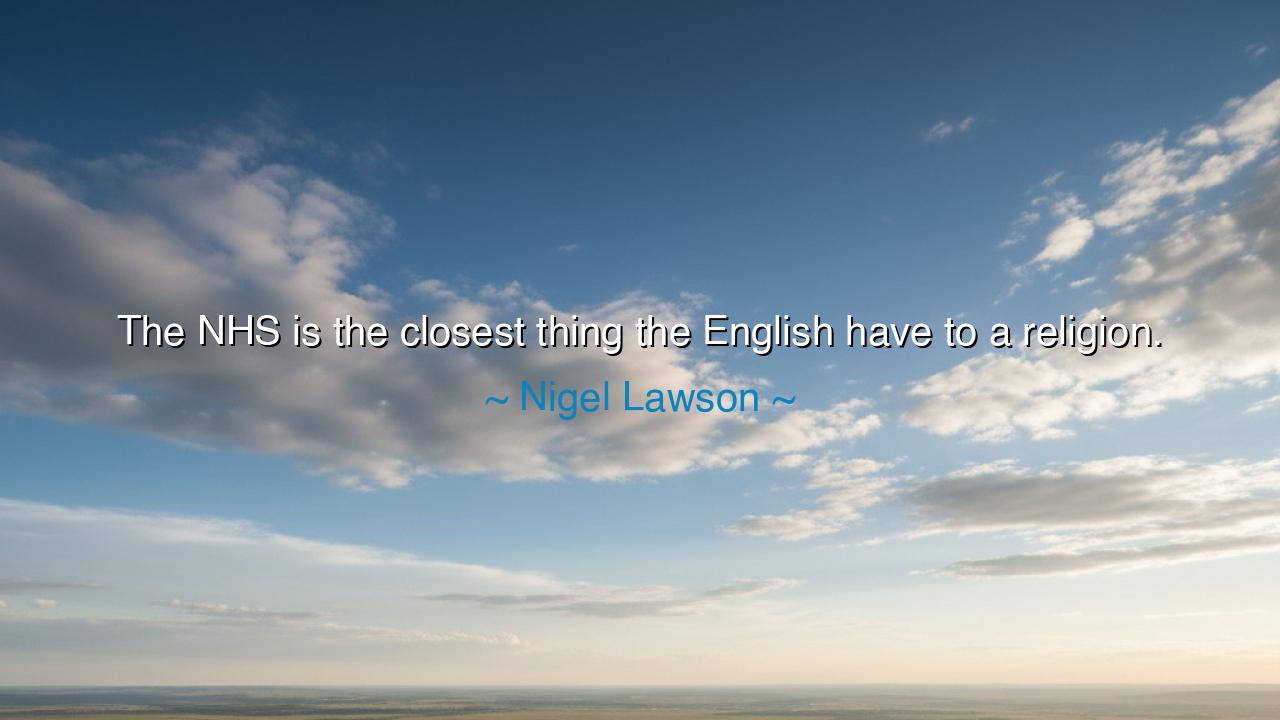
The NHS is the closest thing the English have to a religion.






When Nigel Lawson, the British statesman and thinker, declared that “The NHS is the closest thing the English have to a religion,” he was not merely speaking of hospitals and medicine — he was naming something far deeper, something sacred in the heart of a nation. In those words lies a profound truth about faith, identity, and the human longing for care. He saw in the National Health Service (NHS) not only a system of healing, but a symbol of collective virtue — a temple of compassion where the sick and the weak are treated not for profit, but for humanity. In this way, the NHS became a kind of modern altar, where belief is expressed not through prayer, but through service, through the saving of lives, and through the moral conviction that every person deserves dignity and healing.
The origin of the quote reaches back to the late twentieth century, when Lord Lawson served as Chancellor of the Exchequer under Prime Minister Margaret Thatcher. It was a time of economic upheaval and ideological struggle in Britain — when the balance between individual freedom and collective responsibility was fiercely debated. In this climate, Lawson’s remark captured a paradox: that in a nation often skeptical of organized religion, there still remained a deep, almost spiritual reverence for one institution — the NHS. His words were half-observation, half-revelation: that the British people, who had once knelt before kings and churches, now placed their faith in something made by their own hands — an ideal of universal care and moral equality.
To understand the spirit behind this, we must look back to the birth of the NHS in 1948. The Second World War had left Britain weary but united. Out of the ashes of destruction, the people demanded something that would embody the values they had fought for — fairness, solidarity, compassion. From that longing, the NHS was born under Aneurin Bevan, who promised that healthcare would be free at the point of need, available to all, regardless of wealth. It was, as Bevan said, “a piece of real socialism,” but more than that, it became a moral covenant — a testament that the nation’s strength was not in empire or wealth, but in its care for the least of its citizens.
For generations, the NHS became not merely a public service, but a symbol of hope and trust. When a child was born, when a life was saved, when the dying were comforted, it reminded people that society could still be kind. Doctors and nurses, clothed in blue and white, came to embody the modern priesthood — not of theology, but of compassion. In a world fractured by politics and belief, the NHS remained a rare sanctuary where all were equal. Thus, when Nigel Lawson spoke, he saw what many already felt in their hearts: that this institution had transcended policy to become sacred — a national creed born of empathy and sacrifice.
Consider the time of COVID-19, when the world was gripped by fear and uncertainty. In the United Kingdom, every evening, people stepped out of their homes to clap for the NHS — not out of habit, but out of reverence. The sound of applause echoing through empty streets was a kind of secular prayer, a collective act of gratitude for those who risked everything to protect others. In that moment, the truth of Lawson’s words became unmistakable: the NHS was not just a service; it was a faith in humanity itself.
And yet, like all sacred things, the NHS carries both glory and fragility. It demands constant care, for even the strongest ideals can wither when neglected. To treat it as a religion is not to worship blindly, but to guard it faithfully — to remember that compassion, once institutionalized, must still be renewed in every generation. It teaches that a nation’s greatness is not measured in gold or empire, but in the kindness it shows to the sick, the poor, and the weary.
The lesson of Lawson’s quote, therefore, is one of reverence and responsibility. He reminds us that faith need not belong only to churches or temples — it can live in the shared human commitment to do good. The NHS is the visible expression of an invisible ideal: that life is sacred, that no one should suffer alone, and that mercy is the highest law of civilization.
So let this wisdom be passed down to future generations: cherish the institutions that bind compassion to action. Defend them, reform them, sustain them — for they are the living soul of a people. As Nigel Lawson saw with clarity, a nation that protects the vulnerable protects its very spirit. For though creeds may fade and empires fall, the faith in one another — the belief that every life is worth saving — shall endure as the truest religion of humankind.






AAdministratorAdministrator
Welcome, honored guests. Please leave a comment, we will respond soon